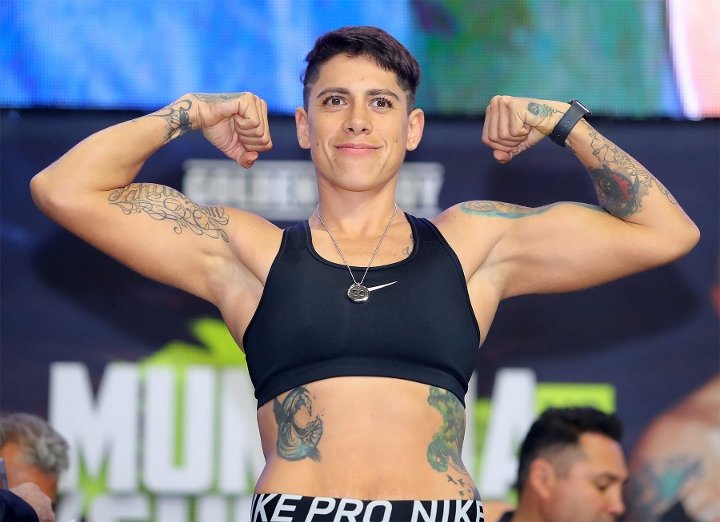Alejandra Jiménez has still been afforded the opportunity to clear her name.
It will now be required in order to restore her previously announced title win.
The two-division and—for now—current unified 168-pound titlist remains the subject of an ongoing investigation over the recent drug test results surrounding her January 11 title fight versus Franchon Crews-Dezurn (6-2, 2KOs). Mexico’s Jimenez (13-0-1, 9KOs) claimed a 10-round decision in their DAZN-streamed bout at The Alamodome in San Antonio, Texas, with the official verdict since overturned to a No Decision by the Texas Department of Licensing and Regulation (TDLR) on Monday.
The fallout stems from a January 10 testing sample as collected by Voluntary Anti-Doping Agency (VADA), with the test showing adverse findings of the banned substance Stanazol in Jiménez’ system. The test took place on the eve of the fight but with the results not learned until January 24 when VADA reported the finding to the World Boxing Council (WBC), one of the two sanctioning bodies whose titles were at stake along with the World Boxing Organization (WBO).
From there came launched investigations by both sanctioning bodies. TheWBO issued a Show Cause order to Jiménez, requiring sufficient evidence of wrongdoing or contamination with the aforementioned test. Jimenez was required to submit such proof by Saturday, February 8, according to the timeframe specified in the order issued on January 29.
To date, the only public action taken by Jiménez—other than claiming contamination and providing two clean tests dated December 15, 2019 and January 11, 2020—was to request for her “B” sample to be opened and tested. Given three dates on which to have the sample tested—February 5, 12 or 19—Jimenez has opted for the latter of the three, stating it is the only such date where she can be present.
Baltimore’s Crews-Dezurn tested negative on all three occasions.
The delay has now cost Jimenez recognition as super middleweight titlist at least through the WBCs, who “will provisionally suspend the recognition of super middleweight world champion Alejandra Jiménez until the investigation of the WBC and the process is finished.”
Any such failed efforts to comply with the WBO could also result in her being stripped of the title, along with the sanctioning body’s discretion to demote her in the rankings if not exclude her altogether. The WBO’s by-laws state an exclusionary period of two (2) years, the equivalent of a suspension from any WBO-sanctioned contest.
No sanctioning body possesses the power to suspend any boxer from competing in general, but rather for said boxer to remain ineligible to participate in events with its belt or brand (title eliminators, etc.) at stake.
Any such power to suspend a boxer lies solely with the state or tribal commission overseeing the event. Such action has been taken by the Texas commission, as Jiménez is currently suspended for 90 days pending resolution of her current investigation. Texas state officials declined comment to BoxingScene.com, although such a ruling is consistent with past offenders. Chris Arreola and Marsellos Wilder were both hit with similar suspensions and overturned verdicts in separate fights under Texas jurisdiction.
Arreola saw a December 2015 win over Travis Kauffman—with their heavyweight clash also taking place in San Antonio—overturned after testing positive for marijuana. The three-time heavyweight title contender was also issued a fine by TDLR.
Wilder sought to rebound from a shocking 4th round knockout loss last January in Brooklyn, believing to have done so with a 1st round knockout of Mark Sanchez in their cruiserweight clash last March in Arlington, Texas. The bout was overturned after Wilder—the younger brother to unbeaten heavyweight titlist Deontay Wilder—tested positive for an undisclosed banned substance, which also resulted in a 90-day suspension and a fine.
Should the original result stand for Jiménez, so too will her current suspension and No-Decision ruling, at which time the TDLR will determine the proper fine to accompany the infraction. In the event the “B” sample shows proof of contamination or false positive with the “A” sample, the TDLR will revert the ruling back to a decision win, with the sanctioning bodies to further rule from there.













![Hotstar Premium Cookies 2019 [*100% Working & Daily Updated*] Hotstar Premium Cookies 2019 [*100% Working & Daily Updated*]](https://tahav.com/wp-content/uploads/2019/11/Hotstar-Premium-Cookies-Free-100x70.jpg)



